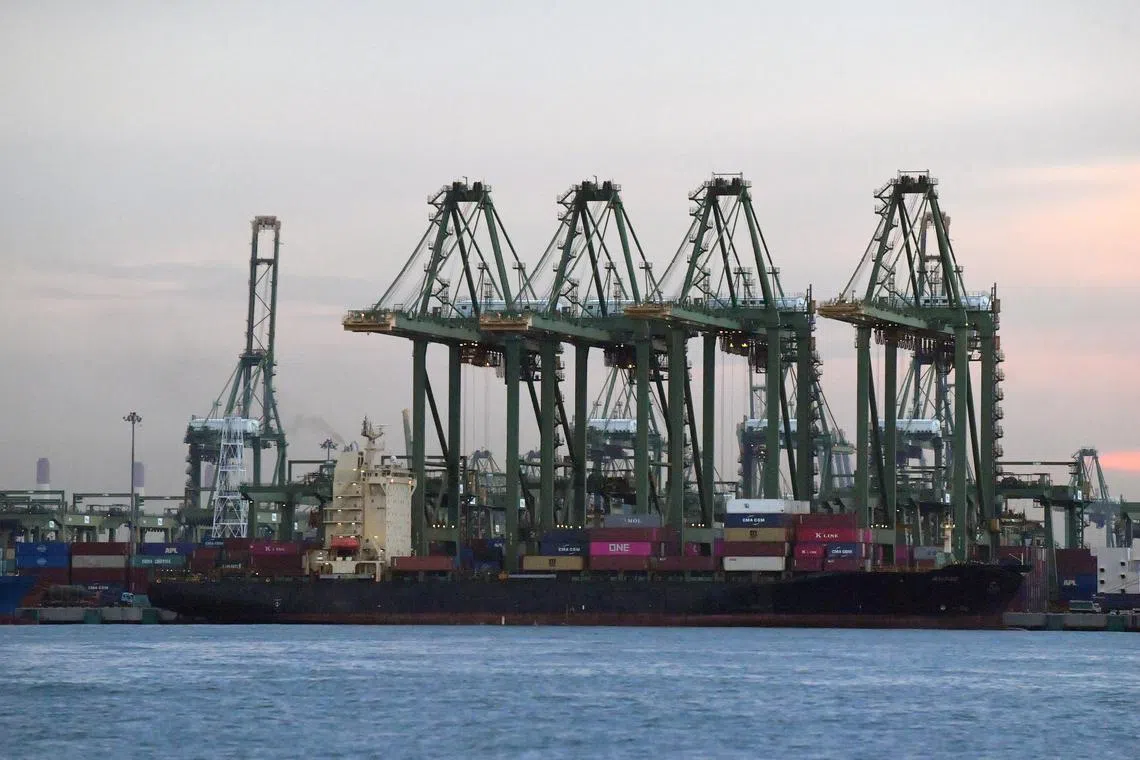Shipping firms in good standing using S’pore port won’t need to provide security deposits from April
Sign up now: Get ST's newsletters delivered to your inbox

The new practice - based on credit-risk profile - will likely benefit 80 per cent of shippers that have been using the port.
ST PHOTO: ALPHONSUS CHERN
SINGAPORE – Shipping companies deemed unlikely to default on their dues will not need to furnish a security deposit or banker’s guarantee to Singapore’s port authority from April 1, said Acting Minister for Transport Chee Hong Tat on Jan 12.
Currently, the Maritime and Port Authority of Singapore (MPA) requires ocean-going vessels calling at Singapore’s port that are billed more than $5,000 annually to furnish a security deposit or banker’s guarantee.
This insures MPA against the risk of default by shipping companies on their port services dues.
However, the MPA’s new practice – based on credit-risk profile – will likely benefit 80 per cent of shipping companies that have been using the port, and improve their cash flow by more than US$20 million (S$26.6 million) a year, Mr Chee said at the Singapore Maritime Foundation (SMF) New Year Conversations 2024 event at the Pan Pacific Singapore hotel.
“This will help all our maritime companies, including small and medium enterprises,” the minister said.
He added that the move was part of the Government’s efforts to reduce regulatory and compliance costs for businesses where possible and reinforce Singapore’s competitiveness as a hub port and international maritime centre.
“MPA will continue to work closely with tripartite partners from the industry and unions to identify further rules we can review and other areas for improvement to simplify our processes, reduce compliance costs and shorten processing time,” he said.
The initiative by MPA comes on the back of a record-breaking year for Singapore’s maritime industry.
Singapore crossed the 3 billion gross tonnage mark for annual vessel arrivals for the first time in 2023,
Eight berths of Tuas Port Phase 1 became operational in 2023, while 70 per cent of reclamation was completed for Phase 2.
While a lot of milestones were achieved by Singapore’s maritime industry in 2023, more needs to be done in 2024, said Mr Chee.
“There is still a lot of potential for further growth and to bring about new opportunities for businesses and new jobs for our workers,” he noted.
Hence, MPA has been studying ways to digitalise documentation and workflow of bunkering, an industry term that refers to the supply of fuel to ships.
If bunker delivery paperwork is digitalised, it will reduce compliance costs and improve productivity for vessels taking bunkers at the port, and save the maritime industry 40,000 man-days a year.
Mr Chee gave the example of bunker supplier Golden Island Diesel Oil Trading, which started working with MPA on digital bunkering trials in November 2022.
On Dec 1, 2023, the company transitioned to full digital bunkering, enhancing its productivity and efficiency, and saving at least two hours of manual data entry work every day.
The minister said apart from reducing costs and enhancing productivity, digital bunkering also improves crew safety by eliminating the need for cargo officers to cross between vessels to exchange documentation.
“MPA plans to make digital bunkering a mandatory feature in due course,” he said.
The other key area that Singapore must keep investing in is attracting, developing and retaining its talent pool, Mr Chee said.
“One key effort in this regard is redesigning maritime job roles. Job redesign takes time, planning and effort, but it can pay off for both employers and workers,” he said.
In 2023, SMF launched the Maritime Workforce Transformation Guidebook
“I encourage more companies to tap the available support from the Government and NTUC to explore how job redesign can help to transform your organisations and workforce,” he said.
Those efforts were in addition to SMF’s MaritimeONE Scholarship, which has been a mainstay of Maritime Singapore’s talent development landscape since its inception in 2007.
To provide young graduates with opportunities for experiential learning and to build closer rapport with the maritime sector, SMF also launched the MaritimeONE Internship Programme in 2022.
SMF has since placed more than 100 students in nearly 70 leading maritime companies.



